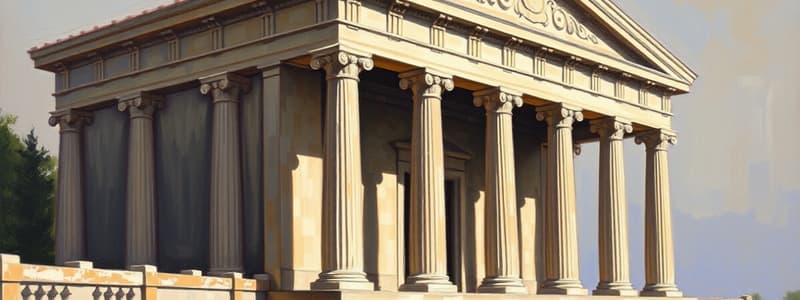Podcast
Questions and Answers
What is the Doric Order?
What is the Doric Order?
- The simplest of the classical Greek architectural styles (correct)
- An architectural style with a triangular top
- A style featuring fluted columns with volutes
- The most ornate of the classical orders
What features are characteristic of the Ionic Order?
What features are characteristic of the Ionic Order?
- Unadorned columns
- Ornate decorations with leaf carvings
- Fluted column shaft with volutes and a large base (correct)
- A triangular pediment
What distinguishes the Corinthian Order?
What distinguishes the Corinthian Order?
- It is characterized by an elaborate capital with leaf carvings (correct)
- It features a plain unornamented lintel
- It has no fluted shaft
- It has no base
What is a pediment?
What is a pediment?
What is a cornice?
What is a cornice?
What does a frieze refer to in architecture?
What does a frieze refer to in architecture?
What is an entablature?
What is an entablature?
What is an architrave?
What is an architrave?
Define a column.
Define a column.
What is a column shaft?
What is a column shaft?
What is entasis?
What is entasis?
What is fluting in relation to columns?
What is fluting in relation to columns?
What is the capital of an Ionic column?
What is the capital of an Ionic column?
What is a volute?
What is a volute?
What is a rosette?
What is a rosette?
What does the acanthus leaf motif represent?
What does the acanthus leaf motif represent?
Define the base of a column.
Define the base of a column.
What is an Anta temple?
What is an Anta temple?
What is a double anta?
What is a double anta?
What is a tholos?
What is a tholos?
Define prostyle in classical architecture.
Define prostyle in classical architecture.
What does amphiprostyle mean?
What does amphiprostyle mean?
What is dipteral architecture?
What is dipteral architecture?
What characterizes peripteral architecture?
What characterizes peripteral architecture?
Define pseudoperipteral.
Define pseudoperipteral.
What does pseudodipteral mean?
What does pseudodipteral mean?
What is a podium in classical architecture?
What is a podium in classical architecture?
What is the naos or cella?
What is the naos or cella?
What is the pronaos?
What is the pronaos?
What is the Forum of Trajan?
What is the Forum of Trajan?
What is the Column of Trajan known for?
What is the Column of Trajan known for?
What are a few monuments influenced by victories?
What are a few monuments influenced by victories?
Flashcards are hidden until you start studying
Study Notes
Classical Orders in Architecture
- Doric Order: Simplest Greek style; features unadorned columns without a base.
- Ionic Order: Characterized by fluted columns, capitals with spiral volutes, and large bases.
- Corinthian Order: Most ornate style; includes a base, fluted columns, and decorative leaf carvings on the capital.
Architectural Elements
- Pediment: Triangular upper part of a temple adorned with sculptures.
- Cornice: Projecting molding above columns or pillars.
- Frieze: Broad horizontal band of sculpted or painted decoration typically found near the ceiling.
- Entablature: Continuous horizontal structure supported by columns, consisting of architrave, frieze, and cornice.
- Architrave: Plain lintel at the bottom of the entablature.
- Column: Upright pillar, often cylindrical, that supports arches, entablatures, or stands alone.
Column Details
- Column Shaft: Vertical portion of a column between the base and capital.
- Entasis: Slight convex curve in the column shaft, correcting visual illusions of concavity.
- Fluting: Series of shallow vertical grooves on the column shaft.
- Capital: Top part of an Ionic column, decorative and functional.
- Volute: Spiral scroll-like form found on Ionic and Composite capitals.
Ornamentation and Motifs
- Rosette: Rose-like ornamentation, often used as a badge of office or honor.
- Acanthus Leaf: Decorative motif seen on Corinthian columns.
- Base: Bottom part of Corinthian columns.
Temple Architecture
- Anta Temple: Refers to posts or pillars adjacent to temple doorways.
- Double Anta: Pillars located at the front and back of the temple, enhancing symmetry.
- Tholos: Ancient Greek circular shrine encircled by columns.
Temple Plans
- Prostyle: Temple layout with columns only at the front, no side or rear columns.
- Amphiprostyle: Temple design featuring four columns at both front and back.
- Dipteral: Double row of colonnades encircling the cella and porches.
- Peripteral: Single row of columns surrounding the entire temple.
- Pseudoperipteral: Engaged columns create the illusion of a peripteral layout.
- Pseudodipteral: Columns suggest a dipteral setup without an inner colonnade.
Foundation and Space
- Podium: Raised platform of the temple, accessed by stairs, typically built from brick and faced with marble or travertine.
- Naos or Cella: Central area of a Greek temple housing the deity's statue.
- Pronaos: Porch area in front of the naos.
Notable Monuments
- Forum of Trajan: Architectural complex in Rome designed by Apollodorus of Damascus, includes a forum and markets built between 106-112 C.E., with the column completed in 113 C.E.
- Column of Trajan: Roman triumphal column erected in 113 C.E. commemorating Emperor Trajan's victories in the Dacian Wars.
Influential Monuments from Victories
- Column of Trajan: Celebrates Trajan's triumphs in Dacian Wars.
- Temple of Castor: Associated with Castor and Pollux, believed to aid the Republic during battle; stands on the site where they supposedly announced the victory.
Studying That Suits You
Use AI to generate personalized quizzes and flashcards to suit your learning preferences.




